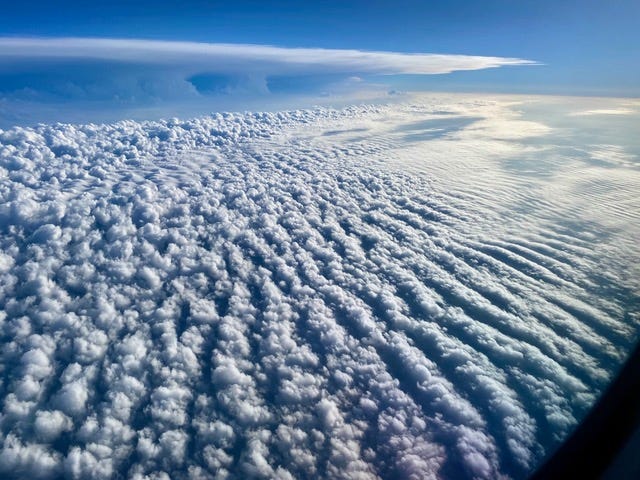As you know, the name of my Substack is “Awakening Heart.”
What is it to live a life with an “awakened heart?” you might ask.
What is it to awaken your heart when your heart has gone to sleep?
Clearly, I am not speaking of how many beats your heart beats per minute. I am speaking of that heart inside you that gets brittle and closes itself off when someone has hurt you, broken their word with you, betrayed your trust, or simply refused to do the simple thing you ask.
I am thinking of how your heart gets brittle when someone does not respect your boundaries, respond to your longings, or behave in reckless ways that somehow leave you with a wound.
And what you are left with instead is a brittle heart: one that breaks easily.
…A heart that holds resentment, regret, and the desire for revenge.
I know because I’ve been there. So have you.
And yet, to live this way, this way of living with a closed heart, leads to avoiding people, leaving them, or holding negative wishes for their lives. We wind up in a “world of hurt.” I know that that is a cliché. I also know it feels like living in the center of an open wound when you are in “a world of hurt.” The whole world is engulfed in pain.
“When your eyes are tired the world is tired also,” poet David Whyte shares with us.
The Buddha, I understand, compared our lack of willingness to grant forgiveness to another like carrying a lump of hot coal in one’s palm. You desperately want to throw it at the person who betrayed you. But you can’t let go of the coal. It burns your palm. It won’t leave. The person who is pained, who hurts, who is burned, and bruised, is you. Not them.
Living that way costs us our peace. Living that way costs us our freedom. Living that way costs us our happiness.
Consider this possibility: Forgiveness sets us free. “A Course in Miracles” tells us, “Forgiveness is the Key to Happiness.”
Since I first dived into that book many years ago, that distinction has been the key to my living my life with an awakened heart.
What is forgiveness?
It is the giving up, the letting go – but really giving up -- of our resentment, our regret, IN EXCHANGE for freedom. It’s a good exchange, a powerful exchange.
Yet, even knowing this, sometimes we don’t forgive. We hold on to a grudge or a resentment FOREVER. We would rather die than let go of that resentment.
Forgiveness is a simple exchange. It’s an opening of a hand that you have held with a tight fist, keeping resentment in there, the lump of hot coal that it is. To repeat that metaphor, here: you want to let go but you can’t. You want to throw it at someone instead, to hurt them. But it sticks to you; it won’t leave your fist. And who gets burned in the process is you.
To forgive – to give as before. Before, when there was love present, trust present, connection present, belonging to one another present, and peace present. To give as before.
Why, when the freedom on the other side is so attractive, though not obvious, won’t we forgive?
Well, there are two misconceptions we have and one big, grand, unbelievably humongous addiction that keeps us from being free.
The two misconceptions are:
We think if we forgive someone, we are condoning their behavior. So, the first thing to think with (can you think with this?) is that forgiveness does not mean condone. Perhaps say that a few times to yourself until your heart can hear it. You can forgive someone and call the police. You can forgive someone and fire them. You can forgive someone and not stay married to them. But the divorce will be a lot easier, and even amicable, like mine was in 1971. And, despite that, I first started with “he did me wrong,” we are now friends. We even write (email!) to one another! And since he is a great, creative artist with an extraordinarily playful and quirky sense of humor, I get a big chuckle of laughs that I never would have had had we not remained friends.
When you fire someone after you have forgiven them, the conversation of firing them can embody a whole lot of completion, move a lot easier, and be a good ending to a relationship whose time has come to an end.
Forgiveness is for you, not them. Who gets set freed up in forgiveness is you do.
The second confusion we human beings have is that forgiveness means deserve. It has nothing whatsoever to do with deserve. So, you have to let that one, too, where your mind says “But, but, but, they don’t deserve it,” let go. Deserve it or not, it doesn’t matter. It’s not in the equation. Forgiveness has nothing to do with deserve.
You may have to just sit with that and consider that possibility for a while, as well.
With forgiveness, who gets freed up is you. I am aware I just said that before. I am saying it again, intentionally.
And, last, and here is the Biggy, when we ask the question, “Why can’t I forgive them?” The answer is simple. Are you ready?
Drum roll, please……Are you ready???
Well, here goes: You’d rather be right!!!
It’s a delicious feeling, the feeling of “being right.” More than that, we are addicted to it. It is hard-wired into our bodies. Human beings would rather be right than ANYTHING.
Being right gives us a weird sense of satisfaction, but it also costs. It costs us our health, our well-being, our connection to others, our connection to ourselves, and even our peace.
Sometimes, I think we could put on people’s gravestones, “I died, but I was right.”
So, ultimately, forgiveness is an exchange. It is an exchange of being right for happiness.
I have found that it is impossible to invent, create, or author a new future when the past is already stuck in it. Which it is, unless forgiveness has been accessed.
Once there was a participant who took a course with me. In that course, The Heart of Leadership (it’s a live, in-person course), we work with forgiveness for some time, as forgiveness is the key to coming to a place where your past no longer must be the future. People usually have a future given by the past. But in The Heart of Leadership, we give people an opportunity to INVENT a future, a new future. And for that invention to take place requires an empty canvas, not one filled with all the stuck energy of the past that still haunts us, awaredly or unawaredly.
Here is this young man’s story. Let’s call him Johnny.
Prior to taking The Heart of Leadership, Johnny never smiled. He was sad all the time. Others who worked with him knew him as someone who never smiled. He gave me permission to share his story with others.
Johnny signed up for the army with his best friend. They were both sent to Iraq.
Johnny was the platoon leader, in the first tank.
That day on Patrol, his friend said, “I want to be in the first tank.”
Johnny said, “No.”
His friend begged. He said, “Let’s flip a coin.”
Johnny said, “Okay.”
The coin landed in the dirt. His friend won.
His friend was in the lead tank, Johnny in the second.
Johnny watched the lead tank blow up as it hit an explosive device.
He jumped out of his tank and held his friend as his friend died in his arms.
Johnny had kept the coin in his pocket, since then.
He wore his friends’ dog tags.
He would not forgive himself.
He never smiled; he never let himself be happy.
He thought it would dishonor his friend if he was happy.
In the work we did on forgiveness, in that course, Johnny forgave himself.
He also forgave his friend for dying.
He got released and freed up.
He had been diagnosed with PTSD. He smiled the whole time between days 3 and 4. He had a new lease on life.
At the next session of the course, three weeks later, Johnny asked to speak with me privately. We did. Johnny put his hand into his pocket and out came the quarter. As he gave me the quarter, he said, “Here. I don’t need this anymore. I want you to have it.”
I keep that quarter in a special box to remind myself of the power that forgiveness is to set me free. And to remind me of Johnny and the very special gift he gave the planet – his own freedom, love, and happiness -- when he found the coin of forgiveness.
The following is a poem that I wrote about heartbreak after reading Parker Palmer's incredible book “On the Brink of Everything.” In it, this brilliant author speaks about the brittle heart.
Heart Break
Amba Gale
When heartbreak makes its way toward us from the farthest horizon, we start to close in fear that we will be flattened by the loss, never to stand again. When heartbreak comes close like this, we close ourselves, never to face or feel our wounds. The brittle heart is easy to break. Pain shut off and shoved aside hides in the years, until a time when fearless heart we grow and our fierce soul takes on the past, releases all our tears, and heals the broken heart. Broken open now. Breaking open, not apart; This is how we heal our hearts. From Crossing Thresholds, Island Reflections, published May, 2020
My deep desire is that these posts inspire you, move you, contribute to you, and contribute to your life.
Feel free to share them with others, in any way that works for you, if you are called to do so.
I am dedicating myself to expanding my writing as a contribution, including writing my next book, and I am happy to let you know that this particular Substack will, in one way or another, be woven into that book. The current working title of the book is Awakening Heart: The Art of Sacred Listening. That book is based on the principles of The Heart of Leadership.
Forgiveness is, indeed, sacred listening.






Thank you, James. Ongoing, indeed. Always wanting and needing to have the powerhouse that Forgiveness is, like Grace, like Divine Love, accessible to us.
And you are (deeply) welcome. I did hear from a few folks via my (personal) email today about how much this particular post has meant to them and how right the timing is.
This is a deep piece, and perhaps not for people "going public" about it, so I very much appreciate your comment, and your willingness.
What a beautiful story and powerful lesson in forgiveness and letting go of what’s holding us to be free. So many things come up over a lifetime of learning to forgive and let go and this so beautifully encompassed the depth and width of the power we all have to be free. Thank you for this amazing piece.